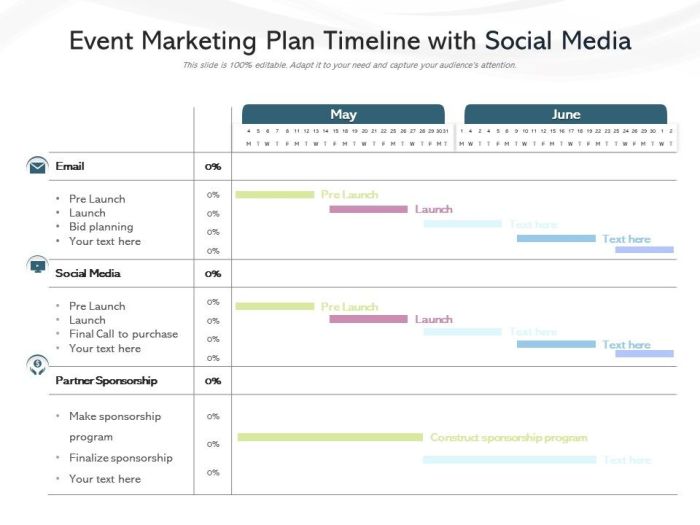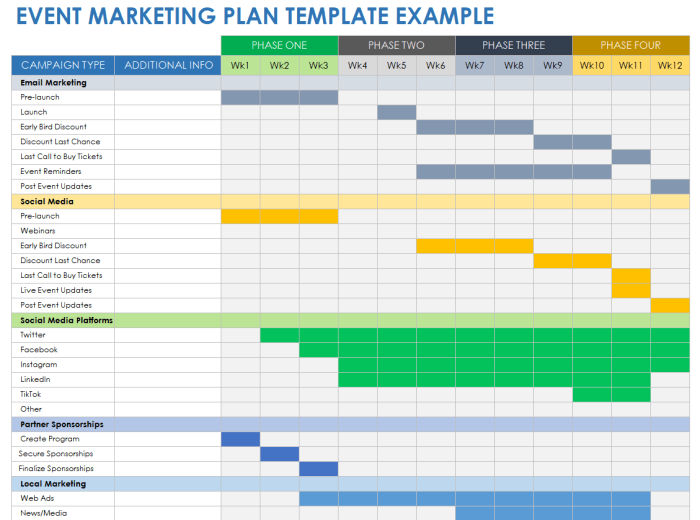Developing an Event Marketing Plan dives into the intricacies of crafting a successful strategy to promote events, combining creativity and data-driven decision-making for maximum impact. Get ready to elevate your event game!
This comprehensive guide will take you through the essential steps and considerations needed to create a dynamic event marketing plan that stands out in a crowded market.
Introduction to Event Marketing Plan

An event marketing plan is a strategic roadmap that Artikels the promotion and advertising strategies to attract attendees to an event. It plays a crucial role in creating awareness, generating interest, and ultimately driving attendance to the event.
Key Components of an Event Marketing Plan
- Target Audience: Identifying the specific demographics and interests of the target audience is essential for tailoring marketing messages.
- Goals and Objectives: Clearly defining the goals of the event and what the marketing plan aims to achieve is crucial for measuring success.
- Promotional Channels: Determining the most effective channels such as social media, email marketing, or traditional advertising to reach the target audience.
- Timeline and Budget: Establishing a timeline for marketing activities and allocating a budget to ensure all promotional efforts are executed smoothly.
- Evaluation and Analysis: Setting up metrics to track the success of the marketing plan and making adjustments based on the performance data.
Examples of Successful Event Marketing Campaigns
Coachella Music Festival:
The Coachella Music Festival has mastered the art of event marketing by creating a buzz on social media, partnering with influencers, and leveraging user-generated content to engage attendees.
Apple Product Launch Events:
Apple’s product launch events are highly anticipated due to their innovative marketing strategies, including exclusive invitations, live streams, and interactive experiences that generate excitement and drive sales.
Super Bowl Commercials:
Super Bowl commercials are a prime example of successful event marketing, with brands investing millions in creative advertisements to capture the attention of a massive audience during the event.
Setting Objectives and Goals: Developing An Event Marketing Plan
Setting clear objectives and goals for an event marketing plan is crucial for the success of the event. It provides a roadmap for the marketing team, helps in measuring the effectiveness of the strategies implemented, and ensures alignment with the overall business objectives.
Importance of Setting Objectives and Goals, Developing an Event Marketing Plan
- Setting clear objectives and goals helps in defining the purpose of the event and what the marketing team aims to achieve.
- It enables the team to focus their efforts on specific outcomes, making it easier to measure the success of the event marketing plan.
- Having defined goals also motivates the team and provides a sense of direction, leading to better coordination and collaboration.
Examples of SMART Objectives for Event Marketing
- Specific: Increase event attendance by 20% compared to the previous year.
- Measurable: Generate 100 leads from the event registration page within a month.
- Achievable: Secure sponsorship from at least three major companies for the event.
- Relevant: Enhance brand awareness by securing media coverage in at least two local newspapers.
- Time-bound: Increase social media engagement by 30% before the event date.
Aligning Event Marketing Goals with Business Objectives
- Ensure that event marketing goals directly contribute to the overall business objectives, such as increasing sales, expanding market reach, or improving brand perception.
- Regularly review and align event marketing strategies with the changing business goals to maintain consistency and relevance.
- Communicate the impact of event marketing on achieving business objectives to stakeholders to demonstrate the value of the marketing efforts.
Identifying Target Audience
Identifying the target audience for an event is crucial for its success. It involves understanding the demographics, preferences, and behaviors of the people you want to reach.
Importance of Understanding Demographics
Knowing the demographics of your target audience, such as age, gender, income level, and location, helps tailor your event marketing efforts to resonate with them effectively. This information allows you to create targeted messaging and promotions that appeal to their specific needs and interests.
- Use surveys, data analysis, and market research to gather demographic information about your target audience.
- Segment your audience based on demographics to personalize your marketing strategies for different groups.
- Adjust your event offerings, promotions, and communication channels to align with the demographics of your target audience.
Understanding Preferences and Behaviors
In addition to demographics, understanding the preferences and behaviors of your target audience is essential for engaging them successfully. This knowledge helps you create a memorable event experience that resonates with attendees and encourages participation.
- Conduct focus groups, interviews, or social media listening to gather insights into the preferences and behaviors of your target audience.
- Use this information to design event activities, content, and interactions that cater to the interests and behaviors of your audience.
- Adapt your event marketing strategies based on the feedback and engagement patterns of your target audience to optimize their experience.
Strategies for Reaching and Engaging Target Audience
Reaching and engaging your target audience effectively requires a mix of online and offline marketing tactics tailored to their preferences and behaviors. Utilize a multi-channel approach to maximize visibility and engagement.
- Utilize social media platforms, email marketing, and targeted online ads to reach your audience where they spend their time online.
- Partner with influencers or industry leaders who resonate with your target audience to increase brand awareness and credibility.
- Create personalized experiences, exclusive offers, or interactive content to engage and retain the interest of your target audience.
Budgeting for Event Marketing
When it comes to event marketing, budgeting plays a crucial role in determining the success of your event. It involves allocating resources effectively to ensure that your event achieves its objectives while maximizing return on investment (ROI).
Cost Elements in Event Marketing
- Venue Rental: The cost of renting a suitable venue for your event, which can vary based on location, size, and amenities.
- Promotional Materials: Expenses for designing and printing promotional materials such as flyers, banners, and posters.
- Advertising: Budget for online and offline advertising channels to promote the event and reach the target audience.
- Staffing: Costs associated with hiring and training event staff, including event coordinators, ushers, and security personnel.
- Catering: Budget for food and beverages for attendees, which can significantly impact the overall cost of the event.
- Entertainment: Expenses for booking performers, speakers, or other entertainment acts to engage attendees and enhance the event experience.
Tips for Optimizing Budget
- Set Clear Objectives: Define specific goals for the event and allocate budget resources based on priority to achieve those objectives.
- Research Costs: Conduct thorough research to estimate the costs of different elements involved in event marketing and negotiate for better deals.
- Track Expenses: Keep a detailed record of all expenses throughout the planning process to ensure you stay within budget and identify areas for cost-saving.
- Sponsorship Opportunities: Explore potential sponsorship deals with relevant brands or partners to offset some of the event costs and increase overall budget.
- Monitor ROI: Measure the success of your event marketing efforts by tracking key performance indicators (KPIs) and analyzing the return on investment to make informed decisions for future events.
Promotional Strategies and Channels
When it comes to promoting your event, utilizing the right strategies and channels is crucial for reaching your target audience effectively.
Social Media Marketing
Social media platforms like Facebook, Instagram, Twitter, and LinkedIn are powerful tools for promoting events. Utilize engaging content, eye-catching visuals, and targeted ads to reach a wider audience and create buzz around your event.
Email Marketing Campaigns
Email marketing remains a highly effective promotional channel for events. Build a strong email list, create personalized and compelling content, and use automation to send timely reminders and updates to your audience.
Influencer Partnerships
Collaborating with influencers in your industry or niche can help amplify your event promotion. Identify influencers with a relevant following and engage them to create sponsored posts, stories, or live streams to increase visibility and credibility.
Examples of Successful Promotional Campaigns
-
Coachella Music Festival: Utilized social media platforms to tease lineup announcements, engage with followers, and create hype leading up to the event.
-
Apple Events: Leveraged email marketing to send exclusive invites, unveil product launches, and generate excitement among loyal customers and tech enthusiasts.
-
NY Fashion Week: Partnered with top fashion influencers and designers to showcase behind-the-scenes content, runway highlights, and exclusive interviews to attract a global audience.
Creating a Timeline and Action Plan

Creating a timeline and action plan is crucial for successfully executing your event marketing strategy. It helps keep everyone on track, ensures tasks are completed on time, and allows for effective coordination among team members.
Setting Deadlines and Milestones
- Set clear deadlines for each task to track progress and stay organized.
- Identify key milestones that mark significant progress points in your event marketing plan.
- Use tools like project management software to create visual timelines and easily monitor deadlines.
Importance of Time Management
- Effective time management is essential for meeting deadlines and achieving goals.
- Encourage team members to prioritize tasks, delegate responsibilities, and avoid procrastination.
- Regularly review and adjust the timeline to accommodate any unexpected changes or delays.
Team Coordination
- Establish clear communication channels to ensure everyone is informed of deadlines and tasks.
- Hold regular team meetings to discuss progress, address challenges, and realign goals if necessary.
- Celebrate achievements and milestones to boost team morale and motivation.
Measuring Success and Analytics
Tracking and measuring key performance indicators (KPIs) is crucial in evaluating the success of an event marketing plan. By analyzing data and metrics, event organizers can gain valuable insights into the effectiveness of their strategies and make informed decisions for future campaigns.
Importance of Analytics in Event Marketing
Using analytics tools is essential for monitoring the impact of different marketing channels. These tools provide valuable data on audience engagement, conversion rates, and ROI, helping organizers understand which strategies are working and which need adjustment.
- Google Analytics: This tool can track website traffic, user behavior, and conversions, providing valuable insights into the effectiveness of online marketing efforts.
- Social Media Insights: Platforms like Facebook, Instagram, and Twitter offer analytics tools that measure engagement, reach, and audience demographics, helping organizers optimize their social media campaigns.
- Email Marketing Metrics: Tracking metrics such as open rates, click-through rates, and conversion rates can help organizers evaluate the success of their email marketing campaigns and make necessary adjustments.
Examples of Key Metrics to Analyze
Organizers can analyze various metrics to assess the impact of their event marketing campaign, including:
- Conversion Rate: The percentage of attendees who take a desired action, such as registering for the event or making a purchase.
- Return on Investment (ROI): The ratio of the revenue generated from the event to the total cost of the marketing campaign.
- Engagement Metrics: Metrics like social media likes, shares, comments, and website interactions can indicate audience interest and participation.
- Attendance Numbers: Tracking the number of attendees and comparing it to the target audience can provide insights into the event’s reach and effectiveness.